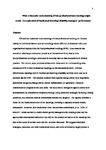What a discursive understanding of interprofessional team meetings might reveal: an exploration of intellectual (learning) disability managers' performances.
| dc.contributor.author | Smart, Cordet | |
| dc.contributor.author | Froomberg, N | |
| dc.contributor.author | Auburn, Timothy | |
| dc.date.accessioned | 2018-09-07T09:49:23Z | |
| dc.date.issued | 2018-11 | |
| dc.identifier.issn | 1356-1820 | |
| dc.identifier.issn | 1469-9567 | |
| dc.identifier.uri | http://hdl.handle.net/10026.1/12235 | |
| dc.description.abstract |
Clinical and academic understandings of interprofessional working are focused mainly on individual factors such as knowledge about different professional roles, and organisational opportunities for interprofessional working (IPW). Less research has examined what happens between people at an interactional level, that is, how interprofessional working is conducted in everyday face-to-face interactions in clinical practice. The current paper proposes a discursive framework for understanding what constitutes IPW in interprofessional meetings at this interactional level. Clinical effectiveness meetings held in intellectual (learning) disability services were used as an example site for IPW. The analysis explored how agenda change points were negotiated, appropriate as agenda change points require collaboration (or agreement) between practitioners to progress to the next point The study found changes in agenda points were accomplished by practitioners conjointly through using discursive strategies including closing questions, and resources such as professional identity and laughter. The agenda provided a frame for the institutional order of the meetings, invoking a trajectory towards timely completion. However, this institutional order was at times subordinated to an 'order of concern', which seemed to enable challenges by managers to the meeting Chair and the agenda that demonstrated adherence not only to the procedural nature of the meetings, but also to the needs of service users and the services discussed. We suggest discursive strategies, resources, and both institutional orders, and order of concerns might provide a framework for developing future training and research, that is able to illuminate how IPW might be enacted in face-to-face team meetings. | |
| dc.format.extent | 1-10 | |
| dc.format.medium | Print-Electronic | |
| dc.language | en | |
| dc.language.iso | en | |
| dc.publisher | Taylor & Francis | |
| dc.subject | Discursive psychology | |
| dc.subject | healthcare teams | |
| dc.subject | intellectual (learning) disability | |
| dc.subject | interprofessional working | |
| dc.subject | meeting agendas | |
| dc.title | What a discursive understanding of interprofessional team meetings might reveal: an exploration of intellectual (learning) disability managers' performances. | |
| dc.type | journal-article | |
| dc.type | Journal Article | |
| plymouth.author-url | https://www.ncbi.nlm.nih.gov/pubmed/30040515 | |
| plymouth.issue | 6 | |
| plymouth.volume | 32 | |
| plymouth.publication-status | Published | |
| plymouth.journal | Journal of Interprofessional Care | |
| dc.identifier.doi | 10.1080/13561820.2018.1500450 | |
| plymouth.organisational-group | /Plymouth | |
| plymouth.organisational-group | /Plymouth/Faculty of Health | |
| plymouth.organisational-group | /Plymouth/REF 2021 Researchers by UoA | |
| plymouth.organisational-group | /Plymouth/REF 2021 Researchers by UoA/UoA04 Psychology, Psychiatry and Neuroscience | |
| plymouth.organisational-group | /Plymouth/REF 2021 Researchers by UoA/UoA04 Psychology, Psychiatry and Neuroscience/UoA04 Psychology, Psychiatry and Neuroscience MANUAL | |
| plymouth.organisational-group | /Plymouth/Research Groups | |
| plymouth.organisational-group | /Plymouth/Research Groups/Centre for Brain, Cognition and Behaviour (CBCB) | |
| plymouth.organisational-group | /Plymouth/Research Groups/Centre for Brain, Cognition and Behaviour (CBCB)/Behaviour | |
| dc.publisher.place | England | |
| dcterms.dateAccepted | 2018-07-03 | |
| dc.rights.embargodate | 2019-7-24 | |
| dc.identifier.eissn | 1469-9567 | |
| dc.rights.embargoperiod | Not known | |
| rioxxterms.versionofrecord | 10.1080/13561820.2018.1500450 | |
| rioxxterms.licenseref.uri | http://www.rioxx.net/licenses/all-rights-reserved | |
| rioxxterms.licenseref.startdate | 2018-11 | |
| rioxxterms.type | Journal Article/Review |


